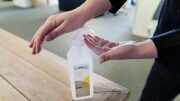In week 48, 2,883 corona cases were registered in Norway. That is 21% less than the week before, but at the same time, 12% fewer Norwegians were tested.
In week 48, a total of 111,253 people were tested, a decrease of 12% from the week before.
The proportion of positives among those tested fell from 2.9% in week 47 to 2.6% in week 48, the National Institute of Public Health’s (FHI) weekly report shows.
R-number below 1
The R-number, the expected number of cases generated by one case, is now calculated at 0.93.
“Mathematical modeling indicates that the increase in the spread of infection has stopped and that the national trend is now most likely declining – with a reproduction figure of 0.93 after November 5,” the FHI noted in its weekly report.
In the period from October 26 to November 5, the R number was calculated to be 1.4.
© NTB Scanpix / #Norway Today






VERY good news. Congratulations, Erna/Høyre and Camilla! 🙂
Could the facemask mandates … finally … have had anything to do with this?
At the other end of prevention, there are concerns about the proposed vaccines.
I basically support vaccination, but according to Norway Public Health, there is a correlation between (lifelong) narcolepsy victims and the 2009 swine flu vaccinations when they were young.
ScienceNorway.no, “Norwegian study links flu vaccine to narcolepsy risk”
“The Norwegian Institute of Public Health has found an elevated risk of narcolepsy among children and young adults who were vaccinated against the swine flu seven years ago. Some who did not take the vaccine against the pandemic of 2009 also developed this severe sleeping disorder.”
Anne Lise Stranden JOURNALIST tuesday 28. mars 2017 – 06:20
***
(My ex-wife and I had decided our little 1.5 year old son would get the 2009 vaccination, but before I took him out the door to go to the emergency vaccination center in Lørenskog, I did some double-checking Internet research and discovered the new concern about the adjuvant for the vaccine for the general population. There was mercury in it, and a proportionately large dose for small people – children – would magnify the mercury’s harmful effect.
An adjuvant tries to amplify the effectiveness of a small, insufficient amount of vaccine, to help mass production and distribution/innoculation. By contrast, in Germany for example, political leaders and other elites were getting the full amount of the original vaccine in their innoculations.
I found out the temporary telephone number of the Lørenskog vaccination center and talked to the supervising nurse. When I asked her, she confirmed the vaccine they were using had the adjuvant and seemed reluctant to say more, so I did NOT take my little son to get vaccinated, and apparently that was a very wise decision.)
On British Independent, someone has claimed the COVID vaccines don’t have an adjuvant because of their nature, but that should be checked.
***
HOWEVER, on Independent a commenter wrote THIS:
“My only concern is will the COVID19 vaccine make COVID21 worse, similar to what was seen with the SARS vaccine and COVID19.”
My response:
A cite would have been helpful, R.:
“Antibody-dependent enhancement and SARS-CoV-2 vaccines and therapies”
Wen Shi Lee, Adam K. Wheatley, Stephen J. Kent & Brandon J. DeKosky
Nature Microbiology volume 5, pages1185–1191(2020)
Antibody-based drugs and vaccines against severe acute respiratory syndrome coronavirus 2 (SARS-CoV-2) are being expedited through preclinical and clinical development. Data from the study of SARS-CoV and other respiratory viruses suggest that anti-SARS-CoV-2 antibodies could exacerbate COVID-19 through antibody-dependent enhancement (ADE). Previous respiratory syncytial virus and dengue virus vaccine studies revealed human clinical safety risks related to ADE, resulting in failed vaccine trials. Here, we describe key ADE mechanisms and discuss mitigation strategies for SARS-CoV-2 vaccines and therapies in development. We also outline recently published data to evaluate the risks and opportunities for antibody-based protection against SARS-CoV-2.
I should add that my principal opponent on Independent has said the COVID19 vaccines do not have adjuvants, but he always seems to take the British government line on issues, for some reason 🙂 , so that should be checked.
The latter concern should still be investigated.